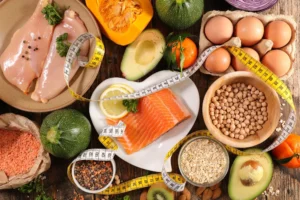Emotional eating is a common habit in which people use food to deal with their feelings instead of eating to satisfy their hunger. It’s fine to eat for comfort once in a while, but depending on food to deal with your feelings can make it harder to stay at a healthy weight and be healthy in general. Emotional eating can be caused by worry, anxiety, boredom, sadness, or even happiness, and there is a deep and complicated link between emotional eating and mental health.
When they feel stressed, a lot of people turn to food to calm down or take their minds off of things. This behavior might help for a short time, but it usually leads to shame, guilt, and a circle of bad habits. The first step to having a healthy relationship with food and better mental and emotional health is to understand how your eating habits are rooted in your emotions.
How anxiety and stress change the way people eat
The part that stress plays is one of the most important links between mental health and emotional eating. Cortisol is a hormone that makes you want to eat more, especially fatty, salty, and high-fat foods. It is released when your body is under stress. The brain’s reward system is set off by these foods, which gives you a short-term rush of pleasure. This makes them great for dealing with mental pain.
But long-term worry and anxiety can keep cortisol levels high, which can make you eat too much and possibly gain weight. People who eat when they’re stressed might not even be aware that they’re doing it because it becomes a habit. They might grab food as a distraction without stopping to see if they’re really hungry.
Depression and Cravings for Food
Many people who eat when they’re depressed do so regularly. When someone is depressed, feels lost, or lacks drive, they may turn to food to briefly improve their mood. Eating can help you forget about your mental pain or give you a short-term sense of control.
Some people who experience sadness lose their appetite and eat too little, but for many others, this feeling increases their desire for carb-heavy or processed foods. If you don’t address both the mental and physical aspects, these decisions can make you feel tired, guilty, and depressed, making it harder to break the cycle.
How the brain works and comfort foods
An important part of upset eating is the brain. Dopamine is a chemical in the brain that makes us feel good. It is released when we eat foods we like, especially those that are high in sugar and fat. In the short run, this makes us feel good and makes us more likely to do it again.
Over time, the brain may start to link food with feeling better. When we are feeling stressed, lonely, or sad, our brains tell us to eat to help us deal. When we do something over and over again, it turns into a habit, and emotional eating happens automatically when we’re feeling bad, even if it doesn’t help us anymore.
Feelings of Hunger vs. Actual Hunger
Being able to tell the difference between emotional and physical hunger is a key skill that can help you control your emotional eating. Emotional hunger strikes quickly and often comes with a desire for certain comfort foods. At times, it’s very important, very emotional, and not related to real food needs. Physical hunger, on the other hand, comes on slowly and can be filled with many things.
To break the routine of emotional eating, you need to learn to stop and think about what kind of hunger you’re feeling. Do you eat because I’m hungry or because I’m bored, angry, or stressed? Taking a moment to be aware can make room for better decisions.
Mood, Sweating, and Self-Esteem
Low self-esteem often triggers emotional eating. People who don’t like themselves may turn to food to fill a void or dull negative emotions. Emotional eating can make you feel worse about your body and your self-worth, especially if it causes you to gain weight or have health problems.
In this circle, people with low self-worth eat to feel better, but this often makes them feel worse, leading them to eat even more. To improve eating habits that last, it’s important to work on your self-esteem through therapy, self-care, and personal growth.
Breaking the Cycle with Help for Mental Health
One important way to stop upset eating is to take care of your mental health. Talking to a doctor or counselor can help you figure out why you’re eating when you’re upset, learn better ways to deal with your problems, and become more emotionally strong. Cognitive-behavioral treatment (CBT) works especially well because it helps people figure out and change their harmful habits and ways of thinking.
Support groups, even ones that meet online, can help people feel like they are not alone and that others understand. Hearing about how other people deal with similar problems can help you feel less ashamed and more motivated to make positive changes.
Getting more emotionally aware
People often eat emotionally when they aren’t in touch with their thoughts. To become more emotionally aware, you need to check in with yourself often and name your feelings without judging them. Write in a journal, meditate, or do awareness exercises to deal with your feelings in a healthy way. These practices will make you less likely to turn to food for comfort.
Once you know how you feel and why, you can find other ways to deal with your problems that will really help, like calling a friend, going for a walk, practicing deep breathing, or doing something creative. Over time, these options become more worthwhile and helpful than turning to food.
Taking Care of Your Mind and Body
To stop eating when upset, focus on nurturing your body and mind. Eating whole, nutrient-dense foods can help keep your hormones, mood, and energy levels in check. Blood sugar stays stable when you eat a healthy, balanced diet. This can help with mood swings and cravings.
Taking care of your mental and emotional health is just as important. You can do this by practicing good limits, getting enough sleep, and moving around every day. Once your physical and mental needs are met, you won’t want to eat to feel better.
How to Have a Healthy Relationship with Food
Food shouldn’t make you feel guilty or ashamed; it should make you feel good and give you energy. Giving up restricted diets and food rules that make you feel stressed and cause you to eat when you’re upset is a big part of developing a healthy relationship with food. Slow down, enjoy your food, and pay attention to your body’s signals when you eat mindfully.
When you eat carefully, you’re more likely to stop when you’re full, notice when your feelings are making you want to eat, and treat yourself with kindness instead of criticism. This healthy, planned way of eating is good for your mental health and your health in the long run.
The end result is healing from the inside out
There is no doubt that emotional eating and mental health are linked. When feelings get too much to handle, food can be a strong way to comfort and control yourself. But if you use it too much, it can cause greater problems with your weight, self-esteem, and emotional balance. To stop emotional eating, you need to do more than just change what you eat. You also need to deal with your feelings, learn new ways to take care of yourself, and create a helpful environment.
You can break the cycle and have a healthier relationship with food by paying attention to your emotions, getting help for your mental health, and eating mindfully. Change that endures originates from within, promoting overall health and happiness in life.
Emotional Eating vs. Physical Hunger: Quick Comparison Chart
| Feature | Emotional Hunger | Physical Hunger |
|---|---|---|
| Onset | Sudden and urgent | Gradual and increases over time |
| Craving Type | Specific (e.g., sweets, junk food) | Open to various food options |
| Emotional Trigger | Often linked to stress, boredom, sadness | Not linked to emotions |
| Satiety Recognition | Hard to feel satisfied, may overeat | Stops when comfortably full |
| Eating Speed | Fast and impulsive | Slower, more mindful |
| Post-Eating Feelings | Guilt, shame, regret | Satisfaction, contentment |
| Awareness Level | Often mindless or distracted | More conscious and deliberate |
FAQ: Emotional Eating and Mental Health
Q1: What exactly is emotional eating?
A: Emotional eating is when you eat in response to emotions—such as stress, sadness, boredom, or anxiety—rather than physical hunger. It often involves cravings for comfort foods and happens unconsciously or impulsively.
Q2: How do I know if I’m an emotional eater?
A: You might be an emotional eater if you often eat when you’re not hungry, crave specific foods when upset, eat to soothe yourself, or feel guilt or shame after eating.
Q3: Is emotional eating a mental health disorder?
A: Emotional eating itself is not classified as a mental health disorder, but it can be a symptom of underlying issues such as anxiety, depression, or low self-esteem. Addressing these root causes is important for long-term healing.
Q4: Can therapy help with emotional eating?
A: Yes. Cognitive Behavioral Therapy (CBT), mindfulness-based therapies, and counseling can help you understand emotional triggers, develop healthy coping skills, and reshape your relationship with food.
Q5: What are healthy alternatives to emotional eating?
A: Journaling, deep breathing, going for a walk, calling a friend, or engaging in a hobby are excellent ways to manage emotions without turning to food.
Q6: Can emotional eating affect my physical health too?
A: Yes. Emotional eating can lead to weight gain, digestive issues, nutrient deficiencies, and increased risk of chronic conditions like diabetes or heart disease if it becomes a regular habit.
Q7: How can I stop emotional eating at night?
A: Set a consistent evening routine, reduce screen time, practice mindful relaxation, eat balanced meals during the day, and keep a journal to process emotions before bed.
Q8: Is emotional eating more common in women than men?
A: Emotional eating affects all genders, but women are statistically more likely to report it, possibly due to hormonal fluctuations and societal pressures. However, men also experience emotional eating, often underreported.




